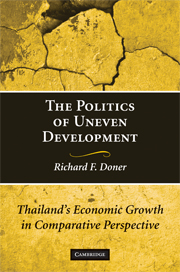Book contents
- Frontmatter
- Contents
- List of Tables and Figures
- Acknowledgments
- List of Abbreviations
- 1 The Challenge of Uneven Development
- 2 Puzzles of Thai Development in Comparative Perspective
- 3 Development Tasks, Institutions, and Politics
- 4 Origins and Consequences of Thailand's Intermediate State
- 5 Sugar
- 6 Textiles
- 7 Automobiles
- 8 Conclusion
- Appendix
- Bibliography
- Index
1 - The Challenge of Uneven Development
Published online by Cambridge University Press: 05 June 2012
- Frontmatter
- Contents
- List of Tables and Figures
- Acknowledgments
- List of Abbreviations
- 1 The Challenge of Uneven Development
- 2 Puzzles of Thai Development in Comparative Perspective
- 3 Development Tasks, Institutions, and Politics
- 4 Origins and Consequences of Thailand's Intermediate State
- 5 Sugar
- 6 Textiles
- 7 Automobiles
- 8 Conclusion
- Appendix
- Bibliography
- Index
Summary
DEVELOPMENT PUZZLES
Students of economic development have commonly focused on the question of why some countries grow and others stagnate, and with good reason. Empirically, the spectacular income gap separating the world's rich and poor nations has become “the central economic fact of our time.” This gap, moreover, now extends beyond the industrialized vs. developing worlds to stark differences among developers. The rich–poor gap has defied easy theoretical explanations. Cultural explanations, for example, foundered on the unexpected success of East Asian countries whose Confucian ethic had previously been identified as an obstacle to growth. Initial endowments of assets such as human resources or manufacturing experience failed to explain the disappointing performance of countries such as the Philippines. Regime type – democracy or authoritarianism – failed to correlate with variation in development outcomes. Postwar development economists' belief that large, state-led projects could liberate entrepreneurs from traditional practices and other rigidities ran up against Latin America's state-led stagnation and Africa's institutional bloat. Finally, the fact that global income levels exhibit not convergence but “Divergence, Big Time,” has undermined the claims of neoclassical economists. As one long-time practitioner notes,
we economists have tried to find the precious object, the key that would enable the poor tropics to become rich. We thought we had found the elixir many different times. The precious objects we offered ranged from foreign aid to investment in machines, from fostering education to controlling population growth, from giving loans conditional on reforms to giving debt relief conditional on reforms. None has delivered as promised.
- Type
- Chapter
- Information
- The Politics of Uneven DevelopmentThailand's Economic Growth in Comparative Perspective, pp. 1 - 24Publisher: Cambridge University PressPrint publication year: 2009



